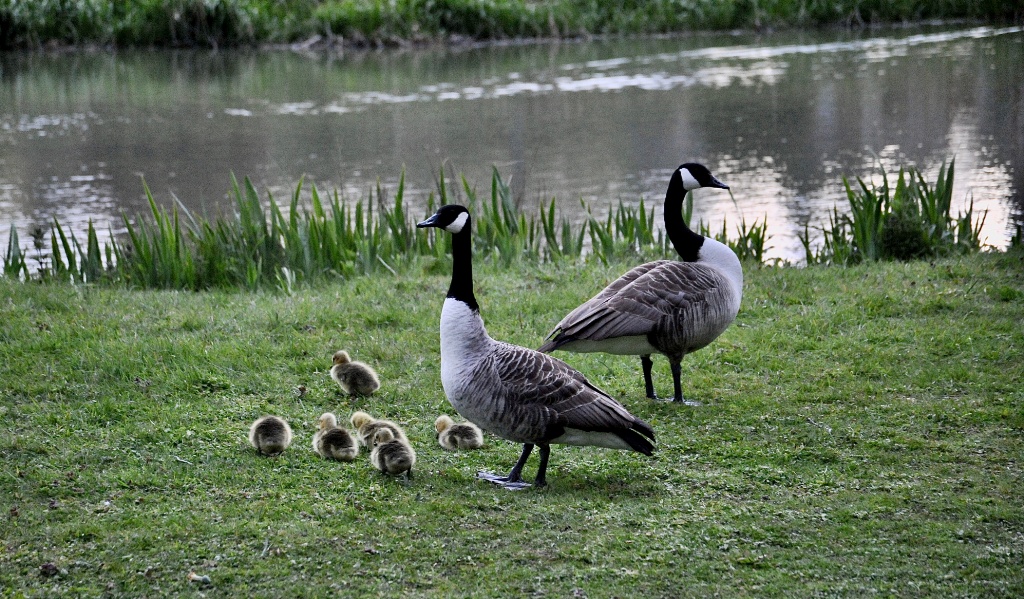New arrivals
There’s a new family in the village. There are eight goslings, but two are hidden behind their mother in the picture. Amazing to think that these little fluffballs will turn into formidable geese.
Dave’s Artshow
Dave Winer (Whom God Preserve) has just done another magical thing — Artshow.
It’s a growing collection of great art, collected from art lovers’ feeds on Twitter. Dave wrote an app that scans the tweet streams, collects the images and displays them as a slide-show. The collection can also be downloaded for use in a screen saver. And of course the app is provided as open source.
Try it: it’s wonderful.
Quote of the Day
”Should Heaven send me any son
I hope he’s not like Tennyson.
I’d rather have him play a fiddle
Than rise and bow and speak an idyll.”
- Dorothy Parker
Musical alternative to the morning’s radio news
Jimmy Yancey | Mournful Blues
Long Read of the Day
Two Centuries of ‘The Guardian’ by Alan Rusbridger
This is a nice essay by the paper’s second-greatest Editor (C.P. Scott takes first place) in The New York Review of Books to mark the bicentenary of the paper. Its survival — and its current financial health — is nothing short of a miracle, given what has happened to most of journalism, and Rusbridger’s piece takes the reader through the good times and the bad.
I’m biased, of course, partly because I’ve written for the Observer (which the Guardian rescued in 1993 after its bruising experience with a corrupt proprietor, Tiny Rowlands) since 1982 (and as a columnist since 1987). But mostly because it was the paper which, for me, opened my eyes to what a newspaper should be like. I was the first member of my family to go to university, and as an undergraduate in 1964 my walk to college took me passed a rather seedy but (for Ireland) rather adventurous newsagent. And it was from there that I took to buying the Guardian every weekday and reading it from cover to cover.
Rusbridger often rubs people up the wrong way as great leaders often do. But I will never forget his steely courage during the Snowden revelations when he was confronted by the full might of the vindictive British state and didn’t flinch. Nobody who saw his performance before a seething Parliamentary Committee that year will ever forget his uncompromising fortitude. It was grace under real pressure, and then some.
The Daily Mail is 125
It seems to be the week for newspaper anniversaries. Unherd has a nice piece by Ed West about it:
The paper is 125 years old today, and for most of that time has represented the soul of a particular kind of England, read in the golf courses of Surrey, the semis of suburban Essex, the pub gardens of Dorset. It is the most popular paper in Britain — it overtook the Sun last year — and easily the most hated. It’s guaranteed to get a laugh, or a sneer, when a comedian mentions its name.
The Daily Mail is not exactly the conscience of Middle England, but it is certainly a guiding spirit, a collection of all its fears and hopes, although more of the former than the latter. It represents people overwhelmingly conservative in their cultural tastes while also having a prurient interest in other people’s sex lives and bodies, and in particular their failures.
The way it covers sex scandals is quintessentially English, with just enough information to both titillate and disgust, a dose of moralising and concluding the story with a description of the property in which the disgusting actions took place and an estimated market value. (“MP’s sordid sex sessions with rent boy in £600,000 maisonette”.)
I’ve never knowingly read the Daily Mail, and indeed I don’t know anyone who does (that’s my liberal bubble for you!) But it’s remarkable is how afraid British politicians are of the paper. Jonathan Powell, Tony Blair’s Chief of Staff, once observed — when talking about how the Blair government ‘managed’ the news agenda — that “the best way to bury bad news was to get it onto the front page of the Guardian.” After the laughter had died away, he explained, “Because if it was the lead in the Guardian the Daily Mail wouldn’t touch it”!
How Internal Combustion Engines work
Wonderful explanation by Bartosz Ciechanowski.
I can imagine my great-great-grandchildren saying: “Mom, is it really true that in the BTE our ancestors propelled themselves around using a series of controlled explosions?”
Footnote: BTE = Before Tesla Era.
This blog is also available as a daily email. If you think this might suit you better, why not subscribe? One email a day, Monday through Friday, delivered to your inbox at 7am UK time. It’s free, and there’s a one-click unsubscribe if you decide that your inbox is full enough already!

